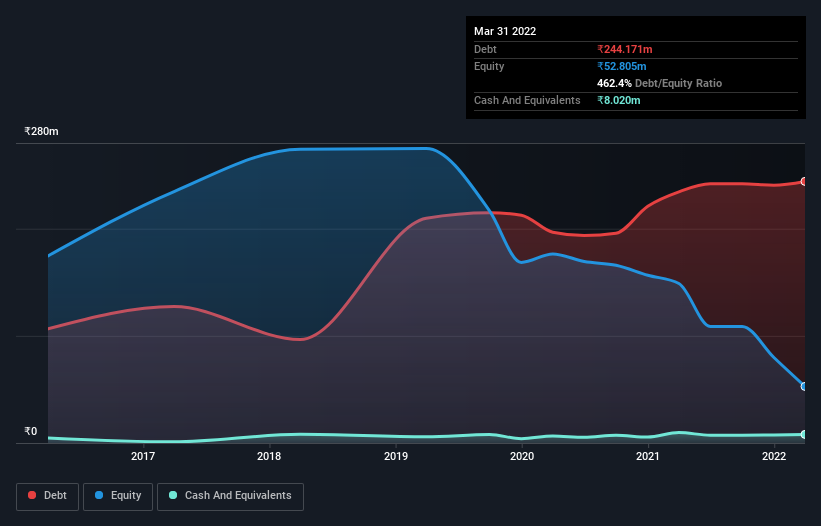Is Vadivarhe Speciality Chemicals (NSE:VSCL) Using Too Much Debt?

David Iben put it well when he said, 'Volatility is not a risk we care about. What we care about is avoiding the permanent loss of capital.' When we think about how risky a company is, we always like to look at its use of debt, since debt overload can lead to ruin. We can see that Vadivarhe Speciality Chemicals Limited (NSE:VSCL) does use debt in its business. But the more important question is: how much risk is that debt creating?
When Is Debt Dangerous?
Debt assists a business until the business has trouble paying it off, either with new capital or with free cash flow. Ultimately, if the company can't fulfill its legal obligations to repay debt, shareholders could walk away with nothing. However, a more frequent (but still costly) occurrence is where a company must issue shares at bargain-basement prices, permanently diluting shareholders, just to shore up its balance sheet. Of course, the upside of debt is that it often represents cheap capital, especially when it replaces dilution in a company with the ability to reinvest at high rates of return. When we examine debt levels, we first consider both cash and debt levels, together.
View our latest analysis for Vadivarhe Speciality Chemicals
What Is Vadivarhe Speciality Chemicals's Net Debt?
The image below, which you can click on for greater detail, shows that at March 2022 Vadivarhe Speciality Chemicals had debt of ₹244.2m, up from ₹234.5m in one year. On the flip side, it has ₹8.02m in cash leading to net debt of about ₹236.2m.

How Strong Is Vadivarhe Speciality Chemicals' Balance Sheet?
Zooming in on the latest balance sheet data, we can see that Vadivarhe Speciality Chemicals had liabilities of ₹198.2m due within 12 months and liabilities of ₹165.8m due beyond that. On the other hand, it had cash of ₹8.02m and ₹21.9m worth of receivables due within a year. So its liabilities total ₹334.0m more than the combination of its cash and short-term receivables.
This is a mountain of leverage relative to its market capitalization of ₹418.6m. Should its lenders demand that it shore up the balance sheet, shareholders would likely face severe dilution. There's no doubt that we learn most about debt from the balance sheet. But you can't view debt in total isolation; since Vadivarhe Speciality Chemicals will need earnings to service that debt. So when considering debt, it's definitely worth looking at the earnings trend. Click here for an interactive snapshot.
Over 12 months, Vadivarhe Speciality Chemicals made a loss at the EBIT level, and saw its revenue drop to ₹218m, which is a fall of 18%. That's not what we would hope to see.
Caveat Emptor
While Vadivarhe Speciality Chemicals's falling revenue is about as heartwarming as a wet blanket, arguably its earnings before interest and tax (EBIT) loss is even less appealing. Its EBIT loss was a whopping ₹85m. Considering that alongside the liabilities mentioned above does not give us much confidence that company should be using so much debt. So we think its balance sheet is a little strained, though not beyond repair. We would feel better if it turned its trailing twelve month loss of ₹96m into a profit. So to be blunt we do think it is risky. When analysing debt levels, the balance sheet is the obvious place to start. However, not all investment risk resides within the balance sheet - far from it. We've identified 4 warning signs with Vadivarhe Speciality Chemicals (at least 3 which are significant) , and understanding them should be part of your investment process.
Of course, if you're the type of investor who prefers buying stocks without the burden of debt, then don't hesitate to discover our exclusive list of net cash growth stocks, today.
If you're looking to trade Vadivarhe Speciality Chemicals, open an account with the lowest-cost platform trusted by professionals, Interactive Brokers.
With clients in over 200 countries and territories, and access to 160 markets, IBKR lets you trade stocks, options, futures, forex, bonds and funds from a single integrated account.
Enjoy no hidden fees, no account minimums, and FX conversion rates as low as 0.03%, far better than what most brokers offer.
Sponsored ContentNew: Manage All Your Stock Portfolios in One Place
We've created the ultimate portfolio companion for stock investors, and it's free.
• Connect an unlimited number of Portfolios and see your total in one currency
• Be alerted to new Warning Signs or Risks via email or mobile
• Track the Fair Value of your stocks
Have feedback on this article? Concerned about the content? Get in touch with us directly. Alternatively, email editorial-team (at) simplywallst.com.
This article by Simply Wall St is general in nature. We provide commentary based on historical data and analyst forecasts only using an unbiased methodology and our articles are not intended to be financial advice. It does not constitute a recommendation to buy or sell any stock, and does not take account of your objectives, or your financial situation. We aim to bring you long-term focused analysis driven by fundamental data. Note that our analysis may not factor in the latest price-sensitive company announcements or qualitative material. Simply Wall St has no position in any stocks mentioned.
About NSEI:VSCL
Vadivarhe Speciality Chemicals
Manufactures and sells organic chemicals, intermediates, active pharmaceutical ingredients (APIs), personal care products, and specialty chemicals in India and internationally.
Acceptable track record low.
Market Insights
Community Narratives



